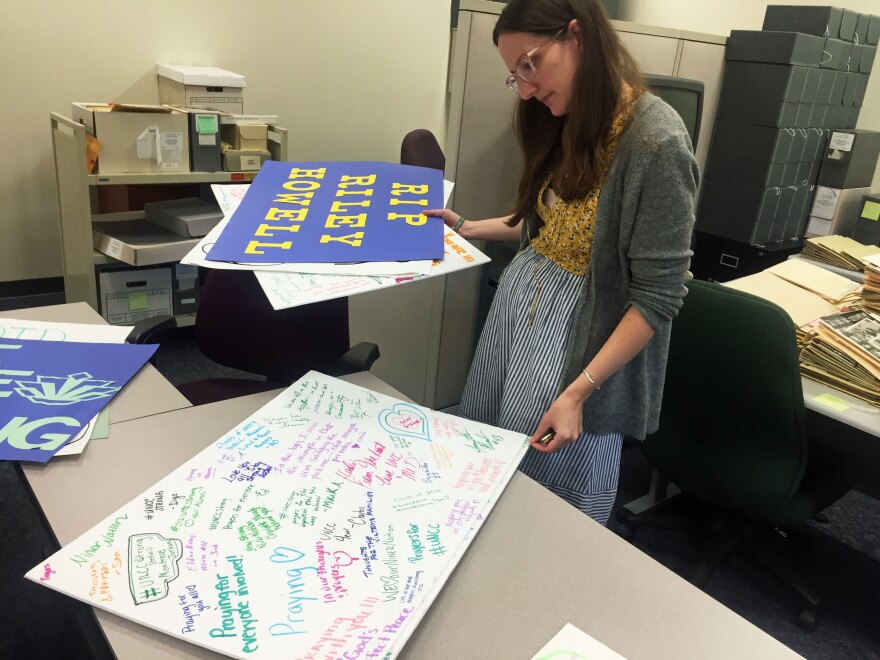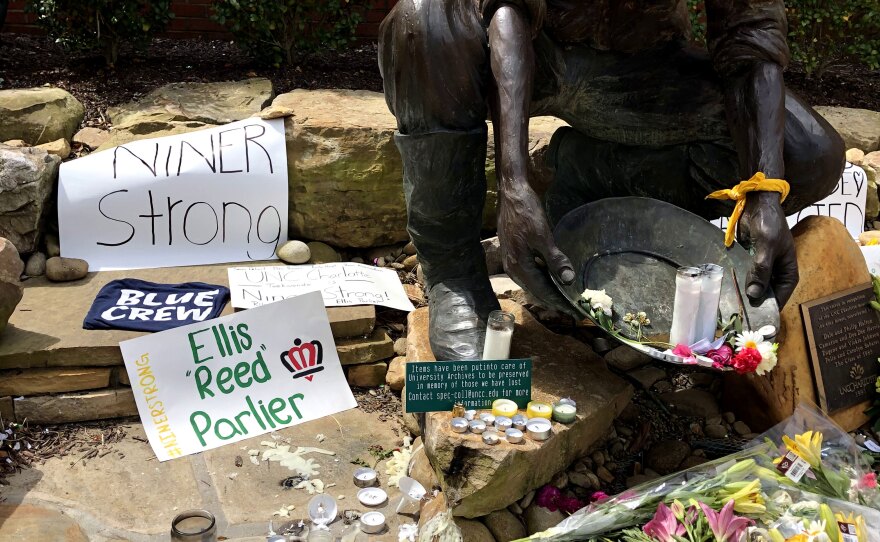In the wake of the deadly shooting on UNC Charlotte’s campus last month, people did what they so often do — create memorials for those lost to the violence. Candles, flowers, handwritten letters, and posters with the names of the victims packed the steps leading up to the Kennedy building, outside where the shooting occurred.
But as stormy weather threatened to destroy the objects, the university had to act quickly to preserve these remembrances.
It’s a quiet day on campus at UNC Charlotte which isn’t usual for this time of year. Classes are done. Graduates have walked. But it’s a different type of quiet in front of the Kennedy building.

"It's still just hard to believe it happened here in a place that should be safe and welcoming and is the home for our students," UNCC Archivist Katie Howell says. "And then when the memorial was up, to just see that outpouring of love and that shared grief that the whole community had, was really powerful."
Howell stands in front of the stairs leading up the building where two students were shot and killed and four others were injured on April 30 when a gunman opened fire during the last day of classes.

Howell points to the wax clinging to the edges of the stairs, frozen from the moment the candles dripped over. There are flowers on the steps, some that still have color to them, others that have dried from the weather. A colorful painted mannequin head wearing a crown of flowers with a peace sign symbol looks like it was recently placed at the site.
Dawn Schmitz, the associate dean for special collections and university archives, says they’ve tried to be sensitive when removing objects. The school even placed signs to let students know that objects are periodically being collected for archival purposes.
"Our practice hasn't been to try to get it immediately because people put it there for a reason," Schmitz said. "Our concern has mostly been about rain and not wanting especially paper items to be damaged."
For many reasons, it’s impossible to forget the violence that occurred less than a month ago. One of those reasons is that people are still placing objects on the steps of the Kennedy building.
"The items went up these first four steps and all the way across. And then you can see that people have written messages on the bricks in front of Kennedy building," Howell says looking down at the bricks. "I've been talking with facilities about how we might be able to save these bricks."
Howell’s job isn’t to dismantle memorials like this, it’s her job to protect them. But in order to do that, items have to be moved. And where they go from the Kennedy building is next door to the lower level of the Atkins Library.
Three large tables pushed together form a U shape in the center of the room. The tables are covered by items recovered from the stairs of the Kennedy building, as well as from the Norm Niner statue on campus. Howell holds a stack of handmade cards from a group of elementary school students.

Out of all of the objects Howell has to handle, it’s these letters that are hardest to read.
"It hurts me to think that these young people have to even imagine a scenario like this," Howell says.
She says during commencement weekend, the families of Ellis "Reed" Parlier and Riley Howell were invited to look through items collected and keep what they wanted.
"Some of the painted stones, there were some stuffed animals, that I think brought a lot of comfort," Howell says. "There was some artwork that had been done and then any kind of letters that were specifically addressed to either Riley or to Reed."
Howell says it feels a little strange to be placing such new objects into acid-free boxes to protect them.
Because this is all new territory, UNCC wants to connect with other schools who have also experienced deadly shootings — like Virginia Tech, as well as professional organizations.
"The Society of American archivists is developing a tragedy response toolkit for archivists who are in this same situation, unfortunately," Howell said. UNCC has been in touch with the Society of American Society of Archivists to get advice on how to best perserve memorial items.
Howell says anyone will be able to request to view the objects: the anonymous poems left, sheet music placed at the one of the memorial sites that was played during a vigil, and hand-painted stones with Riley and Reed’s names. Howell says people who left some the items may want to see their final home — or alumni, or even researchers.

"We don’t ask why they want to see them," she says, "we make them available."
And as important as it is to preserve these objects for the future and document this moment in the university’s history, Howell says it can be draining.
"Yeah, I don't think it's really hit me totally," Howell reflects. "We've been working on these efforts since the very following day — since May 1. I think it will sink in and take its toll. We're trying to care for each other here in this department, knowing that our work is emotional, and we are very close to these items and we'll be working with them for a long time."

But part of what’s so difficult about processing these objects is that the library itself is still recovering. Because of its close proximity to the Kennedy building, police thought it was possible the gunman was in the library. Howell wasn’t on campus during the shooting but when she returned to work the next day, there was evidence all around on the main floor of the library of the fear students must have felt.
"The most upsetting was to see the things the students had left behind in running in fear," Howell says. "You know, they'd left laptops and cell phones and food and everything really. And so gathering those things up and helping students find them again the next day was harder work than I'd imagined."
Doors were also broken as police cleared rooms. At the time of this interview, some of those doors had yet to be repaired, including one that opens to a room of archival stacks which is where items ultimately go to rest until someone asks to view them.
Schmitz says when she returned to campus the day after the shooting, she went into security mode because many of the doors were damaged.
Her office is on the tenth floor of the library. The view is impressive. You can see the Uptown skyline and every inch of campus — including the Kennedy building.
Also located on the tenth floor is a room that houses the university’s rare book collection. The lock to that door was also broken down, but Schmitz made sure that was one of the first to be replaced. Her office door at the time of this interview was still being repaired.

As the archival staff continues to process objects, it’s easy to become overwhelmed by it all. Not just by the emotions that come with handling these objects, but by the sheer amount of items which are still being counted.
Right now, they’re trying to figure out what to do with all the boxes and boxes of candles placed on site. Archivist Katie Howell points out that there just isn’t enough room to keep it all. Some of the candles have been in the rain and it’s hard to see how they could be stored long term. But other candles will likely be held onto.
Peering down into one of the boxes that housed candles and fabric flowers, there was a little flicker. It was one of those battery-powered tea lights— its battery still switched on, its light still bright.








